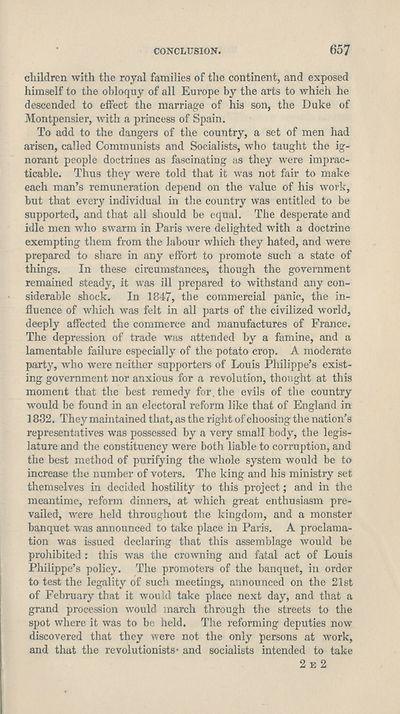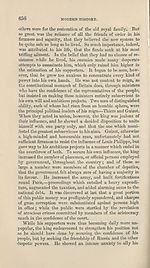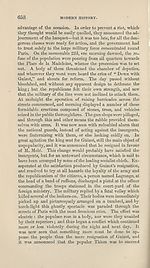Download files
Complete book:
Individual page:
Thumbnail gallery: Grid view | List view

CONCLUSION.
657
children with the royal families of the continent, and exposed
himself to the obloquy of all Europe by the arts to which he
descended to effect the marriage of his son, the Duke of
Montpensier, with a princess of Spain.
To add to the dangers of the country, a set of men had
arisen, called Communists and Socialists, who taught the ig¬
norant people doctrines as fascinating as they were imprac¬
ticable. Thus they were told that it was not fair to make
each man’s remuneration depend on the value of his work,
hut that every individual in the country was entitled to be
supported, and that all should be equal. The desperate and
idle men who swarm in Paris were delighted with a doctrine
exempting them from the labour which they hated, and were
prepared to share in any effort to promote such a state of
things. In these circumstances, though the government
remained steady, it was ill prepared to withstand any con¬
siderable shock. In 1847, the commercial panic, the in¬
fluence of which was felt in all parts of the civilized world,
deeply affected the commerce and manufactures of France.
The depression of trade was attended by a famine, and a
lamentable failure especially of the potato crop. A moderate
party, who were neither supporters of Louis Philippe’s exist¬
ing government nor anxious for a revolution, thought at this
moment that the best remedy for. the evils of the country
■would be found in an electoral reform like that of England in
1832. They maintained that, as the right of choosing the nation’s
representatives was possessed by a very small body, the legis¬
lature and the constituency were both liable to corruption, and
the best method of purifying the whole system would be to
increase the number of voters. The king and his ministry set
themselves in decided hostility to this project; and in the
meantime, reform dinners, at which great enthusiasm pre¬
vailed, were held throughout the kingdom, and a monster
banquet was announced to take place in Paris. A proclama¬
tion was issued declaring that this assemblage would be
prohibited : this was the crowning and fatal act of Louis
Philippe’s policy. The promoters of the banquet, in order
to test the legality of such meetings, announced on the 21st
of February that it would take place next day, and that a
grand procession would march through the streets to the
spot where it was to be held. The reforming deputies now
discovered that they were not the only persons at work,
and that the revolutionists- and socialists intended to take
2e2
657
children with the royal families of the continent, and exposed
himself to the obloquy of all Europe by the arts to which he
descended to effect the marriage of his son, the Duke of
Montpensier, with a princess of Spain.
To add to the dangers of the country, a set of men had
arisen, called Communists and Socialists, who taught the ig¬
norant people doctrines as fascinating as they were imprac¬
ticable. Thus they were told that it was not fair to make
each man’s remuneration depend on the value of his work,
hut that every individual in the country was entitled to be
supported, and that all should be equal. The desperate and
idle men who swarm in Paris were delighted with a doctrine
exempting them from the labour which they hated, and were
prepared to share in any effort to promote such a state of
things. In these circumstances, though the government
remained steady, it was ill prepared to withstand any con¬
siderable shock. In 1847, the commercial panic, the in¬
fluence of which was felt in all parts of the civilized world,
deeply affected the commerce and manufactures of France.
The depression of trade was attended by a famine, and a
lamentable failure especially of the potato crop. A moderate
party, who were neither supporters of Louis Philippe’s exist¬
ing government nor anxious for a revolution, thought at this
moment that the best remedy for. the evils of the country
■would be found in an electoral reform like that of England in
1832. They maintained that, as the right of choosing the nation’s
representatives was possessed by a very small body, the legis¬
lature and the constituency were both liable to corruption, and
the best method of purifying the whole system would be to
increase the number of voters. The king and his ministry set
themselves in decided hostility to this project; and in the
meantime, reform dinners, at which great enthusiasm pre¬
vailed, were held throughout the kingdom, and a monster
banquet was announced to take place in Paris. A proclama¬
tion was issued declaring that this assemblage would be
prohibited : this was the crowning and fatal act of Louis
Philippe’s policy. The promoters of the banquet, in order
to test the legality of such meetings, announced on the 21st
of February that it would take place next day, and that a
grand procession would march through the streets to the
spot where it was to be held. The reforming deputies now
discovered that they were not the only persons at work,
and that the revolutionists- and socialists intended to take
2e2
Set display mode to:
![]() Universal Viewer |
Universal Viewer | ![]() Mirador |
Large image | Transcription
Mirador |
Large image | Transcription
| Antiquarian books of Scotland > Education > Elements of universal history on a new and systematic plan > (677) |
|---|
| Permanent URL | https://digital.nls.uk/127588264 |
|---|
| Description | Thousands of printed books from the Antiquarian Books of Scotland collection which dates from 1641 to the 1980s. The collection consists of 14,800 books which were published in Scotland or have a Scottish connection, e.g. through the author, printer or owner. Subjects covered include sport, education, diseases, adventure, occupations, Jacobites, politics and religion. Among the 29 languages represented are English, Gaelic, Italian, French, Russian and Swedish. |
|---|

